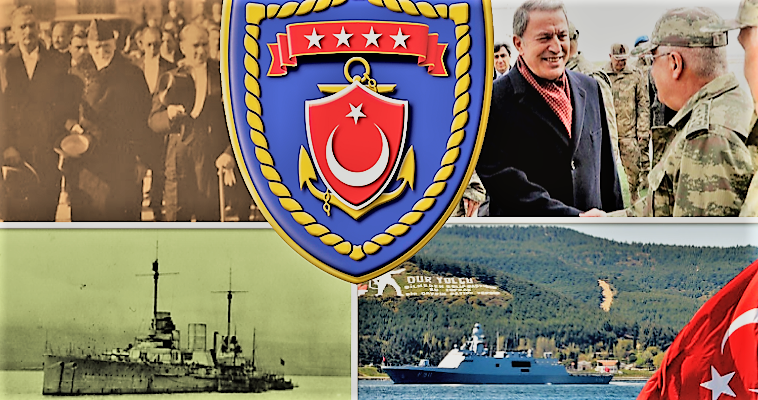Vasilis Kollaros: How Venizelos dealt with Kemal’s “Blue Homeland”
06/08/2020
One of the agreements signed, on a Greek initiative, between Eleftherios Venizelos and Ismet Pasha (Inonou), in October 1930, was the Protocol for the reduction of naval armaments. It provided that “no order of acquisition or construction of military units or equipment shall be made without prior notice to the other Contracting Party a month in advance, with the aim of providing the two Governments with the opportunity to prevent any possible arms race and to provide explanations by both parties in a spirit of complete honesty. “
In other words, each side had to inform the other of each new vessel order six months in advance. It is the period when a general trend of disarmament or reduction of military expenditures prevailed, as a result of the peaceful climate of the League of Nations. It was preceded, at international level, by the Naval Conferences in Washington and London, which raised, but without substantial results, the issue of disarmament.
But how did we get to the signing of this agreement? For Greece, the reduction of the military armaments race was extremely crucial, due to the difficult financial situation of the country, a consequence of both internal problems (i.e. refugees) and the international economic crisis of the previous year.
Also, the foreign policy of the four years 1928-1932 had a different orientation, compared to the previous years. It sought regional co-operation, as the foundation of security and peace in the region. Venizelos himself was opposed to the acquisition of heavy vessels, preferring the country acquire light vessels, such as the “Koundouriotis” type destroyers.
In a speech to Parliament in February 1930, he stressed the need for the Greek navy to acquire light units and a strong air force. The Cretan politician believed that the plane was the weapon that would judge the wars of the future, while he did not miss the opportunity to show interest things aerial. On October 22, 1930, in fact, he boarded a “Junkers G-38”, the largest aircraft of the time, and flew over Athens. It is also not accidental that the Ministry of Aviation was established during Venizelos, with Alexandros Zannas as the first minister.
Kemal’s “Blue Homeland”
At the same time, things were different in Turkey. Knowing what we do now, we would say that Kemal’s Turkey wanted to turn the Aegean into a Turkish lake, into an interwar “Blue Homeland”.
According to a report by G. Panas, Chief of the General Staff of the Navy, to the Ministry of the Navy, in May 1929, it was said that Ankara had ordered destroyers, submarines and anti-submarine vessels to Italian shipyards, which would create a huge naval gap between the two states.
Also, the repair of a former German warship, the “Goeben”, which was in the hands of the Turkish government, was the biggest threat to the Greek navy. The ship would be named “Yavuz” (like today’s Turkish drilling rig) and its capabilities far exceeded those of the Greek armored cruiser “Averoff”. It should be noted that it had twice the displacement of the Greek warship (20,000 tons).
Moreover, the fact that it would be accompanied by the ordered lighter ships rendered, according to Panas, any attempt to approach it by Greek submarines impossible. The report closed, requesting the immediate reinforcement of the Greek fleet with new destroyers. Then, the issue of the purchase of “Salaminia”, a warship that had been ordered by Greece before the First World War, but was never received, because its order was canceled, came to the fore again.
However, it was not easy to further the case of “Salaminia” due to the obstacles that existed, such as the rather heavy budget for the modernization of the ship. Also, the ship’s construction company had terminated the contract with the Greek state. Therefore, the idea of “Salaminia” was quickly abandoned.
“Yavuz” in the Aegean
At the end of May 1929, in minutes of a meeting of naval officers, regarding Greek naval strategy and the measures taken to deal with “Yavuz”, there was talk of executing a new package of naval rearmament, but without excessive costs. The specific collective body proposed that the country. acquire light boats, but also to invest for the first time in the aviation weapon.
Thus, at the beginning of February 1930, the Greek General Staff found itself in a very difficult position, when it was informed, by telegram of the Greek naval escort in Constantinople, that the “Yavouz” carried out a test operation of its engines, which was crowned with success. Therefore, the balance of power, at the level of naval forces, between the two countries, had been upset in favor of Turkey.
Turkey’s slight advantage
The signing of the pact, a few months later, came to “freeze” the -negative for Greece- balance of power, although Venizelos believed that he was establishing a “sslight” advantage in Turkey’s favor. In the opinion of the then Turkish Foreign Minister, Tefvik Rusdi Bey, for the first time the two countries proceeded to conclude such an agreement, “of the utmost importance for the history of Europe in general and more specifically of the Eastern Mediterranean”, while excluding naval rivalry. between the two countries.
Furthermore, “unnecessary expenses are excluded from the naval arms race and our budgets are relieved”. The Greek side, through the Greek Prime Minister, a few days before the signing of the Greek-Turkish pact, stated that “the naval pact is necessary for the consolidation of friendship. After my consultation with Mustafa Kemal yesterday, I am sure that his signature is unnecessary. His sincerity is enough for us.”
Therefore, for the Cretan politician it was an agreement that did not guarantee equality, but the cessation of a naval arms race. That, after all, was his goal. After all, the Venizelos government did not want to follow Turkey in an armaments race, nor could it for fiscal reasons.
It was a strategic decision, which was in stark contrast to the previous understanding of an island state for its security. For the first time, after the Balkan Wars, Greece left a “blue space” in the Aegean to Turkey, due to Turkish naval superiority, but this does not mean that the Turkish fleet was the absolute ruler in Greek waters. The difference between the two fleets was made by “Yavuz”.
In closing, let us clarify that the purpose of this text is not to propose copying Venizelos’ policy towards Turkey, on the issue of naval armaments, as a solution to Turkey’s current aggression. The current situation between the two states has nothing to do with the interwar reality of Greek-Turkish relations. It is completely different.
Suffice it to say that a basic condition of the 1930 agreements was the mutual recognition of the territorial status, as defined in Lausanne. This is not the case today. Erdogan’s Turkey views the geopolitical space in the Aegean and Eastern Mediterranean region in Ottoman terms, bypassing international law and the transnational agreements of the past.
The necessary balance
The “Blue Homeland” doctrine is not just accidental. What we want to emphasize is that, in the face of any attempt by Turkey to become a naval power in the Aegean and in the Eastern Mediterranean in general, there must be a Greek response in order for the balance of power to work.
In 1930, the Turkish “Blue Homeland” was partially balanced by the naval pact and by strengthening the role of the air force, which was skillfully left out of the Greek-Turkish negotiation. As the newspaper “Acropolis” wrote on November 5, 1930, “the naval air force, however, is not included in the agreement”.
Perhaps there was a thought in Venizelos’ mind to transfer the Greek-Turkish arms race from the sea to the air, because as he said “the airplane is suitable as a weapon of the weak”.







